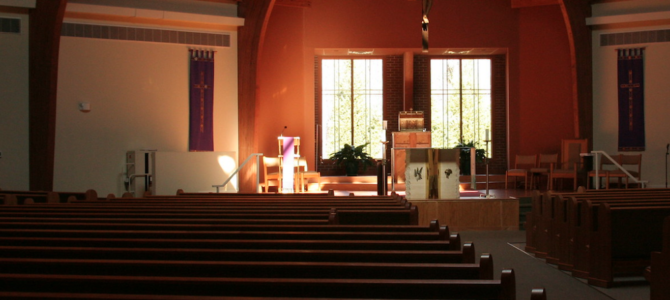
Many American Christians feel great loss as social distancing measures shut them out of attending their churches in person. No matter one’s faith, this experience is especially foreign in a nation that protects freedom of religion and peaceful assembly.
Especially as Easter approaches, Christians are finding it deeply unsettling to be told they can’t gather, can’t pray and sing together as one voice, and — especially disturbing — cannot take communion together. That’s not to say we don’t understand the precautions in a time of viral pandemic. With few exceptions, and with heavy hearts, religious leaders of all major traditions are complying with government efforts to “flatten the curve” of the virus so it does not spread quickly and unmanageably.
But the disruption feels like being cut off from tradition, custom, fellowship, and especially the essence of spiritual life with one’s brethren. People are meant to live in relationship with one another. Despite news about a decline in churchgoing, human beings retain an enormous need to connect with the transcendent.
Nevertheless, there are at least two things Christians can contemplate that offer some measure of solace and comfort and turn this Lenten trial into renewal. First, rediscover the fact that Christians are not strangers to being separated. Second, cultivate a deeper understanding of the terrible power of isolation, an understanding that can prepare us for trials to come.
We Are All Strangers in a Strange Land
Perhaps American Christians can start by recognizing that our situation is not so unique in the grand scheme of history. Those who study scripture understand that while we live in the world, we are not of the world. The joys we experience on this Earth are merely hints of the world to come. More often, we encounter the sins and sorrows of a world with its back to Christ, earning Christians a lot of hostility throughout history.
Of course, isolation maliciously imposed on Christians has little to do with social distancing as a health precaution. But reminds us that Christians are used to being separated from one another and treated as oddballs, especially under hostile regimes.
Such isolation happened right from the beginning. Consider that the Apostle Paul was imprisoned just some 30 years after the establishment of the church at Pentecost in 33 A.D. Although separated from his flocks, he wrote to them and encouraged them to strengthen one another through the trials. Then came the Roman persecutions, and on through the ages. In the modern era, persecutions of Christians, as well as of Jews, have also been intense. Soon after communism came to Russia, thousands of priests were executed, and countless churches and synagogues destroyed.
In North America, a different sort of isolation is occurring within churches, whereby those who express the biblical understanding of marriage are no longer welcomed in many heretofore mainline denominations. In the United States, we see harassing lawsuits against photographers, florists, and cake artists who adhere to the Christian view of marriage. We see it beginning even more starkly in Canada’s law that compels speech and thereby criminalizes any expression of the biblical understanding of marriage.
In China, where the Wuhan coronavirus originated, churches continue to be destroyed. In fact, communist officials in China have taken advantage of lockdowns to destroy empty churches. In-home Bible studies continue to be illegal. Most distressing of all, churches may not even meet online without government approval. China’s social distancing of Christians from one another extends deep into cyberspace.
Before the pandemic, Americans may have taken for granted their ability to worship in person. This situation should be a wake-up call to discern and resist any deliberate efforts to curb freedom of worship in the future. We should remember the faithful in China who are cut off from even meeting online, and understand such isolation as persecution.
Let’s not forget that tyranny is essentially about isolating people in order to control them. Alexis de Tocqueville made this point some 200 years ago when he wrote, “A tyrant puts all his care into isolating people. He readily pardons the governed for not loving him, provided they do not love each other.” The Christian answer to tyranny and isolation is to love one another.
In reflecting on our past, we can learn from it. How does the church survive its isolation and finally thrive? We face adversity with faith. We reach out however we can to help each other and our neighbors of any faith.
The Scourge of Isolation and the Comfort of God
The current climate should also remind us that isolation is a terror for human beings. In the very first chapter of Genesis, God proclaims, “It is not good for man to be alone.” Christian or not, human isolation is unnatural and unhealthy. We are created to live in relationship, and we suffer greatly in the absence of companionship.
There is no shortage of books and articles today on the loneliness epidemic. Reams of peer-reviewed studies tell us social isolation is hazardous for both physical and psychological health. Of course, we don’t need studies to recognize this self-evident truth.
Isolation for the church is even more unnatural. The church is not a building or even a hierarchy of its leaders, but all Christians who pray in communion with one another, which is one reason we feel cut off in the pandemic.
Today’s separation from churchgoing should also remind Christians of ultimate isolation: separation from God. The starkest definition of sin is separation from God, and it is in that separation that we founder and lay waste to ourselves and others. That is why imposed separation — the sort that is intended to weaken and hurt others — is evil.
These extraordinary circumstances should also remind us that in our faith, we are never really alone. God is always with us. To build that consciousness of our Creator’s presence is to be home — to be known and loved, and not to be a stranger. When we lose the privilege of worshiping in person with our brothers and sisters in Christ, we feel homesickness. Appropriately, however, this sorrow comes during Lent, a time of sacrifice and meditation.
“Our Lenten cross feels so much heavier,” reads a recent pastoral letter on the Wuhan coronavirus from Metropolitan Joseph to the faithful of the Antiochian Orthodox Archdiocese of North America. “Perhaps we will see the ways in which our lives had an abundance of things but not an abundance of life.” He says it is also a time to get to know our families in a deeper way and to develop a deeper relationship with God, the mother of God, and the saints. It is a time that allows us also “to turn our homes into little churches in a way that will continue even after we return to normal liturgical life.”
We See Light Best in Times of Darkness
It makes sense that we see the light best in times of darkness. We don’t know what we have until we lose it. Christians are finding new and innovative ways to overcome isolation. As churches livestream their services, it opens them to more people — even throughout the world. My church added a “virtual coffee hour” afterward, in which we had Google meetups with “tables of eight.” It was a chance to get to know some parishioners better in a quieter environment than the parish hall, with each in their homes.
In a way, it was more intimate. In another way, it was a reminder that virtual life is still no match for real life. Lenten discipline itself is a reminder that we are souls that inhabit bodies, and our bodies live in real time and real life. We have appetites, desires, and passions we aim to control through Lent so they don’t control us.
All of this is a powerful reminder that Christians have nothing to fear. In essence, to have faith is to set aside anxieties and to put our trust in the grand plan in which we do our best as servants of Christ.
While we do our part to slow the spread of the virus by social distancing, we also should welcome this unexpected, additional Lenten exercise as a wake-up call to shake us out of complacency and build spiritual reserves for when we face greater persecution. In the meantime, we should keep watch for the paschal light that shines in the darkness, guiding us home and showing us that our Savior conquered death by death.









